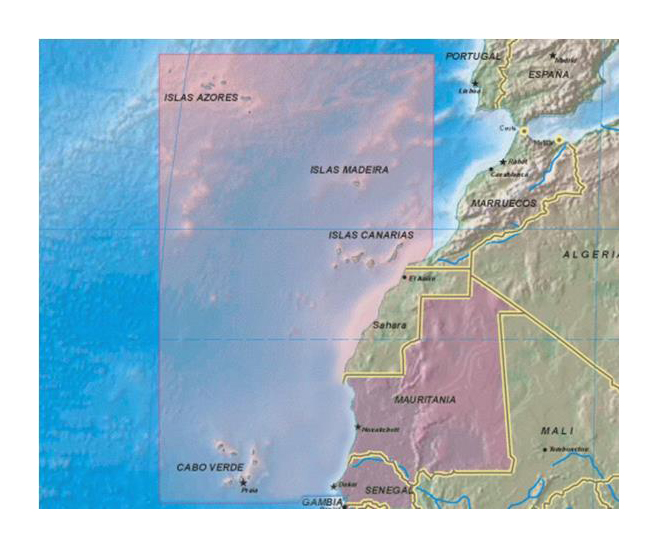POMAC

The Madeira-Azores-Canaries 2014-2020 Territorial Operative Cooperation Programme, (POMAC in Spanish) is the main instrument that the peripheral regions of Spain and Portugal have to offer an efficient response to the common challenges they face in terms of innovation, competitivity, internationalization and sustainable development.
 What is the Cooperation Area?
What is the Cooperation Area?
The Cooperation Area is made up of:
- The macaronesia islands of Madeira, Azores and the Canaries.
- Third party countries that are geographically close to these, which have been invited to take part in the Programme:
Cape Verde, Senegal and Mauritania. This has enabled the area to widen the natural scope of its social and economic influence, culture and cooperation opportunities.
What objectives has POMAC set out to achieve?
The 2014-2020 Programme will operate in five main areas and thematic objectives:

Boost research, technological development and innovation, by:
- Improving the scientific and technological capacity of top priority sectors.
- Increasing the sharing and dissemmination of technology and cooperation between businesses and universities, plus other research centres in top priority sectors.

Improve companies’ competitiveness, creating conditions for them to operate on the international stage.

Promote the adaptation to climate change and risk management, improving the ability to respond to natural risks that may affect the cooperation area.

Preserve and protect the environment and promote the efficient use of resources, through:
- Making natural areas in the tourist resorts more attractive.
- Protecting and improving the conservation of natural areas and their biodiversity.

Increase the capacity institutions and the efficiency of public administrations, consolidating cooperation strategies between the different agents operating within the cooperation area.
What kind of actions does the Programme promote in order to reach its objectives?
The Programme envisages actions to boost research, development and innovation, including:
• Developing, equipping and improving joint research platforms in thematic areas of common interest within the cooperation area.
• Improving the technological capacity of the research centres.
• The exhange and joint training of research staff to allow for participation in European projects.
• Cooperative actions for business innovation and the transfer and dissemmination of technology between companies and universities/other research centres.
It also includeds actions related to the improvement in competitiveness of companies, specifically:
• The promotion of business cooperation for the development and implementation of business models for small and medium sized companies within the cooperation area.
• Legal, technological, commercial and scientific support services, for business innovation and internationalization.
Equally, in terms of risk prevention, the Programme foresees measures to be introduced to:
• Reduce the levels of exposure to natural risks and lack of protection to them.
• Limit the risks due to the inability to inforce an immediate reaction in case of emergency.
• Reduce the vulnerability, both through the incapacity of basic recuperation, and through incompetence, for the permanent recovery of the affected ecosystem.
The projects for the protection of the environment and the efficient use of resources involve:
• Highlighting natural assets by promoting a generation of new complementary products and services related to sustainable tourism.
• The promotion, protection, and heightening of value of the diverse elements of the local historic and cultural heritage.
• Improvements in the expertise, value and management of the biodiversity and ecosystems.
• The creation of small ecological infrastructures and environmentally friendly equipment in specially protected natural environments.
Finally, the Programme anticipates another series of actions related to the improvement of the institutional capacity of the local administrations and public services through cooperation:
• The creation and joint implementation of transnational governing models in top priority areas for the integration of the cooperation area: sea and air transport, cable, satellite and other forms of communications, management of passengers from Third Party Countries, management and territory planning, administration of boundaries and legal aspects, among others.
• Improvements to statistical collation and obtaining of information within the cooperation area.
• Cooperation networks for the improvements to the governing of public services in areas such as employment, education, health, basic socia
Who can benefit from the help offered by the Programme?
The benefactors of the intended actions will be: local and regional public administrations, and public and private law entities linked to these; Universities, research centres, technological institutes and foundations; Chambers of Commerce, business and professional associations, and other social and economic organisms, plus other non-profit public and private entities whose headquarters are located in the Azores, Madeira or in the Canary Islands.

 English
English  Português
Português  Français
Français  Español
Español 